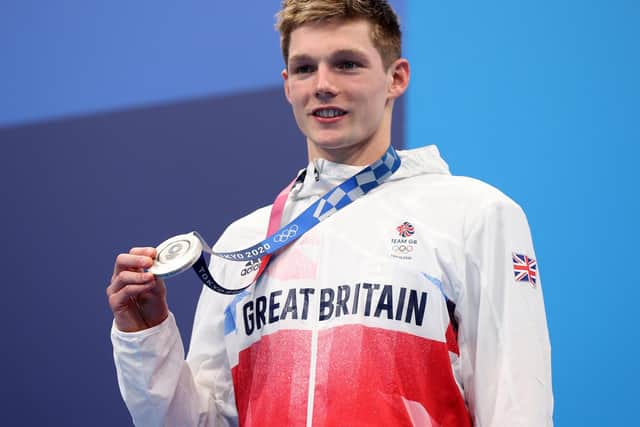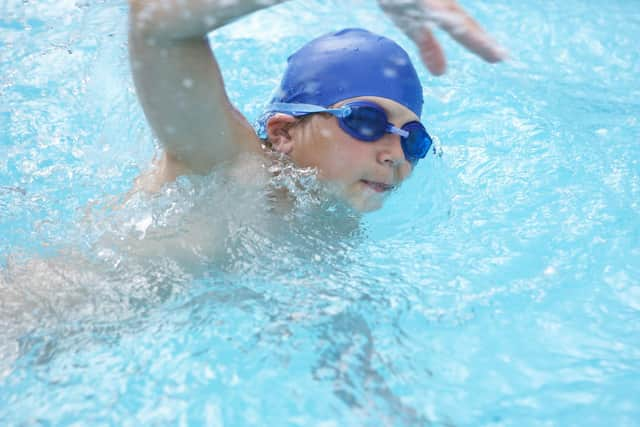Milton Keynes' swimming ‘deserts’ revealed after Team GB Olympics star Duncan Scott slams pool closures
and live on Freeview channel 276
Milton Keynes has no access to an Olympic size swimming pool or a diving pool, as pool 'deserts' have been laid bare after Tokyo Olympics star Duncan Scott warned of the “quite sad” closure of pools across the UK.
Some parts of England have 10 times less public swimming space than others, exclusive analysis shows.
Advertisement
Advertisement
The North East has less than a third of the public pool space found in the South East. And three regions - the North West, West Midlands and East Midlands - only have two public diving pools each, according to the analysis of Sport England data.


In the South East, there are 13 diving pools - but none in Milton Keynes, the town also has no Olympic size swimming pools.
There are five public swimming pool sites in Milton Keynes and two learner pools - the square metre space per 100,00 population is 631 - below the national average.
The public pool sites per 100,000 is 2.6.
Great Britain Diving Federation president Jim McNally said the Government’s policy of providing sport for all was “in tatters”.


Advertisement
Advertisement
He said: “This is a situation which is getting worse and worse and the grassroots sport is being allowed to wither on the vine.”
Swim England said it predicted the nation would lose 40 per cent of its existing pools by the end of the decade, “potentially shutting millions out of the activities they love”.
The Government said its £100 million National Leisure Centre Recovery Fund had “secured the survival and reopening of more than 1,100 swimming pools all over the country”.
JPIMedia’s analysis looked at all pools which are open to the public for free or on a pay-and-swim basis, excluding commercially-owned sites or those only available to members.
Advertisement
Advertisement
There are 1,997 public pools across 1,187 sites in England, totalling 503,233 square metres of pool space.
But when measured against the size of the population, some areas' facilities are spread more thinly than others.
Mr McNally warned that access to diving pools had become a “postcode lottery”, thanks to the loss of ageing facilities and a recent funding focus by sports bodies on a handful of ‘centres of excellence’ for elite athletes.
“To that end, the Government policy of providing sport for all is in tatters,” he said.
Advertisement
Advertisement
“I think there are 11 centres of excellence scattered across the country but they are not scattered demographically properly.
“For example, Birmingham is only now getting a major swimming pool and diving pool when up to now it has not had one, and the only reason it is getting one is for the 2022 Commonwealth Games.
“It is the second largest city in the UK and it had no diving provision for many, many years.”
Earlier this month, Olympic gold medallist Duncan Scott warned of the 'sad' loss of pools across the UK.
Advertisement
Advertisement
Speaking to BBC Breakfast, the Scottish swimmer said: “Where I grew up, in Clackmannanshire, we have not actually got a pool, they’ve all recently shut.”
The 24-year-old, who this summer became the first British athlete to win four medals at a single Games, said learning to swim was “so important for kids to, firstly, feel safe and confident within the water, but it is also quite an important social skill”.
He added: “I think it is quite sad, so hopefully over the coming months something is done about it.”
A spokesperson from Swim England said: “For everyone to be able to enjoy the physical and mental health benefits of swimming, it is absolutely vital that there are appropriate facilities in the right locations.
Advertisement
Advertisement
“Swim England’s 2019 Value of Swimming report forecast that the number of pools in England is set to decline by 40 per cent by the end of the decade, potentially shutting millions out of the activities they love.
“The coronavirus pandemic has only exacerbated the issue and it’s clear that local authorities need both short and long-term funding for facilities.
“Next month, we will be publishing a Value of Facilities report containing new insight which will give a clearer picture of the issue and the steps that need to be taken.”
The department for Digital, Culture, Media and Sport said: "We're prioritising the nation's fitness and health as we build back better from the pandemic, and swimming is a fantastic sport for all ages to enjoy.
Advertisement
Advertisement
“The Government has provided an unprecedented £1 billion of public money to ensure the survival of the grassroots, professional sport and leisure sectors.
“This includes the £100 million National Leisure Centre Recovery Fund which secured the survival and reopening of more than 1,100 swimming pools all over the country.
“On top of this Sport England, the Government's funding agency, has provided over £8.5 million to swimming and diving projects, and over £16 million to Swim England since 2017. “We are putting the support in and are sure that Team GB’s incredible success at Tokyo 2020 will inspire many people to get swimming.”
The MK Citizen contacted Milton Keynes Council for a comment, but had not received a reply at the time of publication.